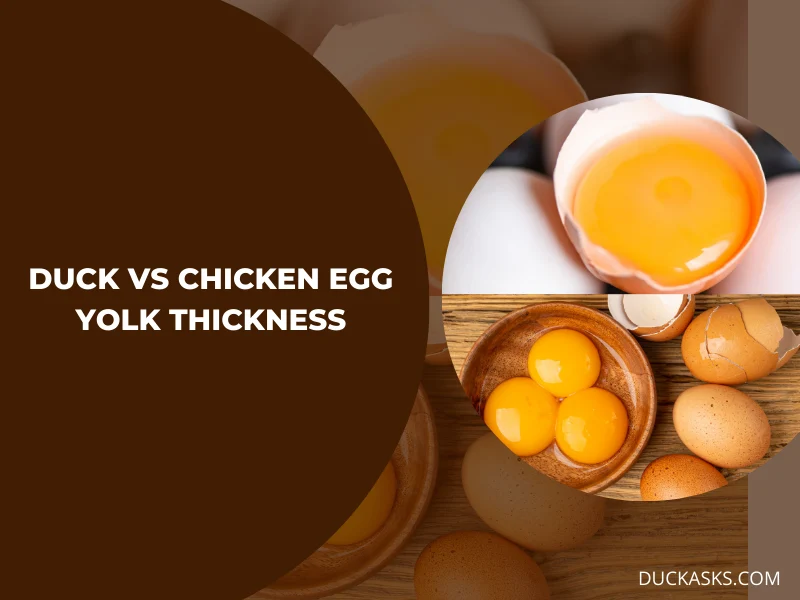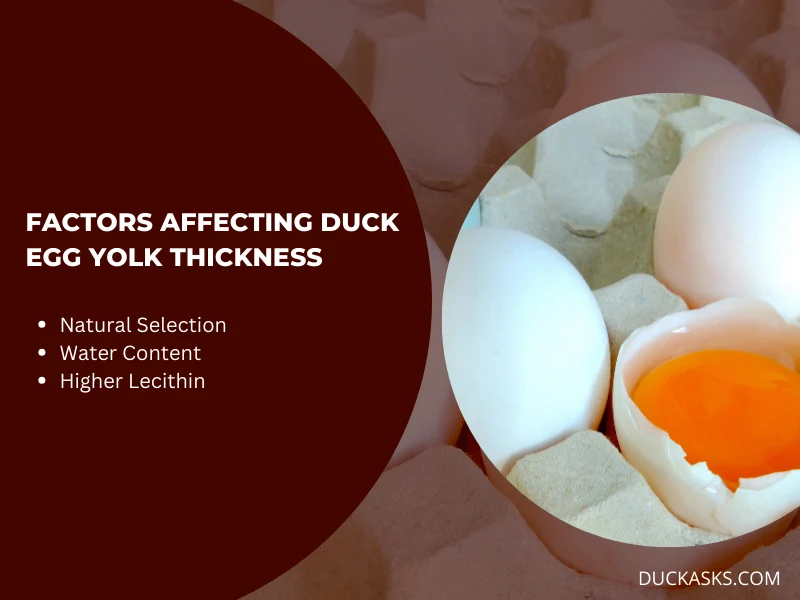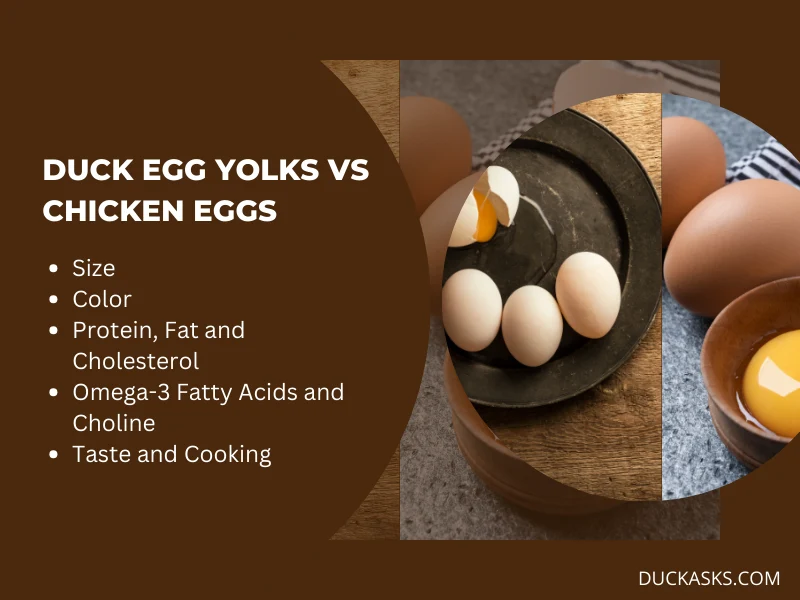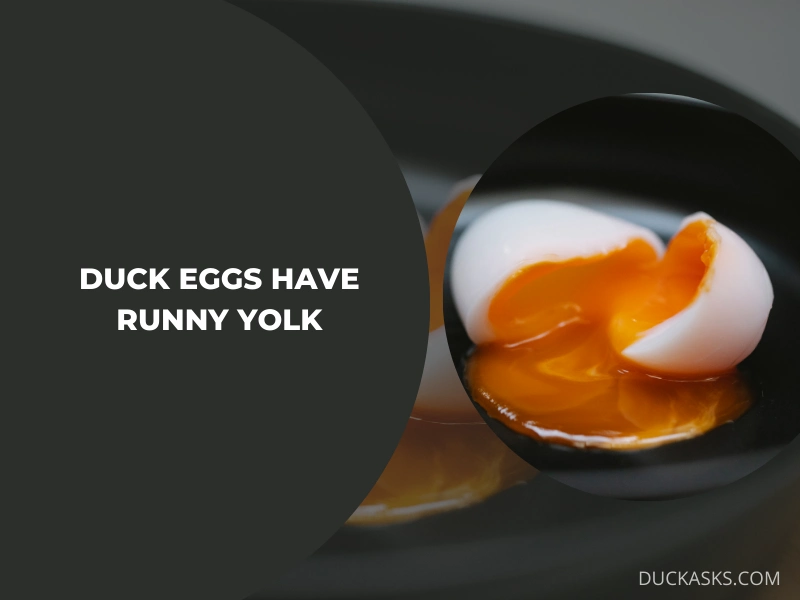Are Duck Yolks Thicker?
You might wonder whether it’s possible to replace chicken eggs with duck eggs when cooking. After all, you would ruin the recipe if the egg yolks didn’t have the same consistency.
So, are duck egg yolks thicker? Yes, duck eggs have thicker yolks than chicken. Usually, duck eggs have a greater yolk-to-white ratio compared to chicken. Plus, the water content in duck eggs is comparatively lower.
Meanwhile, the emulsifier content in duck eggs is higher. All these contribute to the greater thickness of the duck yolk.
Learning about the difference in yolk thickness is essential if you are using both eggs in recipes frequently. The following discussion can guide you to best use both yolks.
Want to learn more about ducks blog:
Are Duck Egg Yolks Naturally Thicker than Chicken Egg Yolks?
Yes, duck eggs have naturally thicker yolks than chicken eggs. You will notice that it takes more effort to break and mix duck egg yolks compared to chicken. They also taste heavier or oilier than chicken eggs.

Usually, a duck egg’s yolk-to-white ratio is slightly higher. For instance, 58% of the chicken’s egg is white and 32% is yolk. And, in comparison, duck eggs are 55% white and 34% yolk.
In other words, a duck egg would naturally have more yolk than a chicken egg of the same volume. As a result, their consistency becomes thicker and tougher.
What Factors Contribute to the Thickness of Duck Egg yolks?
Duck eggs are considerably bigger and have thicker yolks than chicken eggs. The lifestyle variations between the birds contribute much to the difference in their egg yolks. The overall composition of the eggs is also important.

Natural Selection
Evolution or natural selection plays a significant role in determining the thickness of a bird’s egg yolk.
Ducks are waterfowl. They live and lay eggs in cold, wet, and comparatively wilder conditions than chickens. So, duck eggs need to provide more nutrients to the developing embryo to increase its chance of survival.
To provide dense nutrition, duck eggs must contain thicker yolks. It’s also the reason why their eggs’ shells are harder than chickens.
Water Content
The more water content an egg has, the thinner its yolk would be. A close look at the nutritional facts of both eggs tells us that duck eggs have considerably lower water content. Therefore, the yolk tends to be thicker.
In a 100-gram duck egg, protein, fat, carbs, and other non-water components constitute about 32 grams. Which means 68% of the egg is water.
Meanwhile, the non-water components comprise about 23% of a chicken egg. So, about 77% of the chicken egg is water. In other words, duck eggs have about 9-10% less water than chicken eggs.
The lesser water content makes the duck egg’s yolk thicker. This is also why these eggs often become rubbery if you hard boil them.
Higher Lecithin
Lecithin is a major determiner of an egg yolk’s thickness. It’s a phospholipid that acts as an emulsifier. It traps water droplets and stabilizes the fat and protein in the egg yolk. Lecithin also keeps the yolk content separate from the white.
On average, a duck egg would have 6-7% more Lecithin than a chicken. As a result, the duck’s yolk is considerably viscous and thicker than the chicken’s yolk.
Are Duck Eggs Yolks Different than Chicken Eggs?
The thickness isn’t the only difference between duck and chicken egg yolks. There are also significant differences in their color and nutritional content.

Size
Generally, ducks lay larger eggs than chickens. An average chicken egg weighs around 50 grams. Meanwhile, duck eggs are 70 grams.
On top of that, ducks have a greater yolk-to-white ratio than chickens. Therefore, the duck egg yolks are almost always larger.
Color
The color of the yolk is the easiest way to tell between a broken duck and a chicken egg. Chicken yolks are bright yellow; meanwhile, duck yolks are deep orange.
Duck yolks are more orange than chickens because of natural pigments called carotenoids. Green leafy vegetables, one of the major items in the duck’s diet, are rich in these natural pigments.
So, most experts agree that the duck yolk’s deep, rich color reflects the greens the bird eats. This also gives duck yolks more anti-inflammatory properties than chickens since carotenoids are rich in antioxidants.
Protein, Fat and Cholesterol
The protein and fat content of duck and chicken eggs vary a lot according to breed. Some breeds of chicken might lay eggs as nutritionally dense as ducks. However, on average, the duck yolk has more protein and fat than chickens.
Usually, per 100g serving of chicken yolk has 12g of protein. Meanwhile, the protein content in the same amount of duck yolk is slightly higher at 13-14g.
Duck yolks are also considerably fattier than chicken. For instance, a standard serving of chicken yolk has around 9g of fat. Meanwhile, the same amount of duck yolk has 5g of fat.
Also, the fat in duck yolk can provide around 295% of the daily value of cholesterol. In comparison, chicken eggs give you about 140% of the cholesterol DV.
Of course, these values can significantly vary depending on the egg samples, the breed, and the environment it was laid. However, among two similar samples, the duck egg is always richer in protein and fat.
Omega-3 Fatty Acids and Choline
An important reason for keeping eggs in your diet is the Omega-3 fatty acid. It’s an essential nutrient for brain and heart health.
Between two similar egg samples, the duck yolk would have more Omega-3, around 71mg. Meanwhile, chicken yolks provide 37mg.
Choline is another important nutrient present in both eggs. It helps preserve liver function. Being a neurotransmitter, it also has effects on memory and mood. Chicken yolks have slightly more choline than duck yolks (around 4% more of the DV).
Taste and Cooking
Duck yolks taste more intense since they are larger and richer in protein and fat.
The thick yolk also makes any recipe with duck eggs greasier and creamier. Comparatively, chicken yolks are more subtle.
Also, it’s more difficult to whip duck yolks due to their tough consistency. As a result, cooks tend to prefer chicken yolks for recipes like omelets and Caesar salads. Meanwhile, duck yolks are good for custards and puddings.
Can Duck Eggs Have Runny Yolk?
Yes, they do. If you boil a chicken and duck egg for the same amount of time, the duck yolks will be runnier than the chicken.

This is because duck eggs have more yolk and thicker shells than chicken and, therefore, require longer cooking time.
Usually, you could get a standard runny chicken yolk if you boil the egg for 4-5 minutes. In comparison, a duck egg should boil for 6-7 minutes for the same kind of runny yolk.
Conclusion
Duck eggs have thicker and creamier yolks than chicken eggs. This difference becomes important when working in the kitchen. If you aren’t preparing an especially creamy and fatty item, it’s best not to replace chicken eggs with duck.
On the other hand, duck eggs can help you save money on food. Since duck yolks are bigger and more nutrient-dense than chicken, you can have one duck egg for breakfast instead of two chicken eggs. However, beware of the yolks’ high cholesterol.
That’s all for this article. If you found the discussion helpful, share the knowledge with the rest of the internet. You can also follow us on Facebook, X, and Pinterest for similar content in the future.
References
- https://www.localharvest.org/blog/16682/entry/duck_eggs_vs_chicken_eggs
- https://doi.org/10.26656/fr.2017.6%282%29.271
- https://www.motherearthnews.com/real-food/the-proscons-of-eating-duck-eggs-vs-chicken-eggs-zbcz1705/






